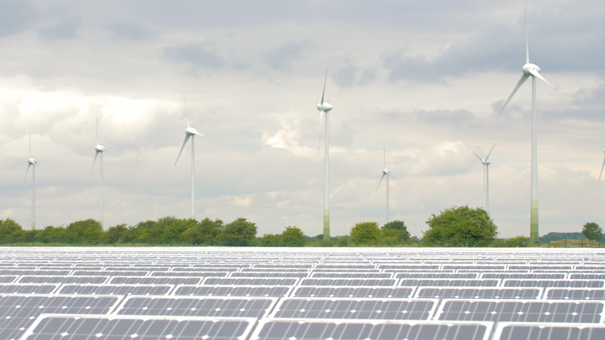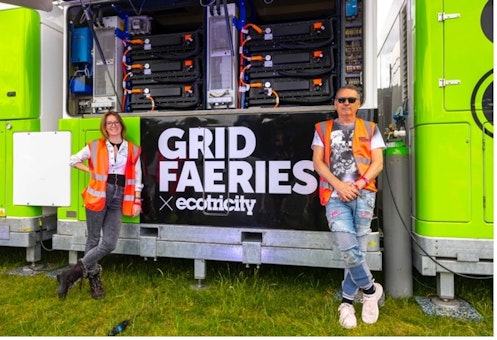
Green Energy
Jobs, growth and energy independence start with green power
February 19, 2026

August 01, 2025
LIDO Festival landed in Victoria Park in June 2025 and immediately recalibrated what a summer gig can and should be. Too many festivals brag about “sustainability” and still run on diesel generators and cheap talk. LIDO didn’t just talk the talk; it rewired the game. Partnering with Ecotricity and Grid Faeries, it showed that you can power a major London festival almost entirely on green energy, and still deliver headline acts like Massive Attack, Jamie xx and Charli XCX without a flicker.
Raising the bar on festival power
Rather than relying on ageing pipes of fossil-fuel hype, LIDO’s main stage ran exclusively off a 3 MWh Grid Faeries battery. Charged by rooftop solar and Ecotricity’s genuinely renewable grid, it kept the music alive for 32 hours straight one weekend, no diesel, no drama. This wasn’t a stunt. Lessons from Massive Attack’s Act 1.5 Climate Action Accelerator shaped a site-wide energy blueprint: electric-vehicle backups, portable battery farms from Greener Power Solutions, and hydrogen from Geo Pura for the secondary stage and community zones. If you’ve ever endured the drone of festival generators in the countryside, you know how radical this is… and LIDO made it look easy.
Electric logistics and zero-emission muscle
Moving tonnes of kit across a festival site without burning diesel trucks sounds fanciful, until KB Events rolled in with electric lorries hauling those heavy batteries around. It cut haulage emissions, turned heads, and proved that festival supply chains don’t have to reek of fossil fuels. Behind the scenes, supported by Grid Faeries & A Greener Future, LS Events choreographed the power and waste strategy like a seasoned conductor; bringing Pearce Hire’s “Power Bible” to life by blending battery, solar and hydrogen feeds into one seamless network.
Crystal-clear sound—no compromise
Every festival fan knows that sound quality can make or break the experience. LIDO tapped a Martin Audio ML3A system supplied by Solotech and mixed by Robb Allan. The result? Every beat, every bass drop, rang out with clarity, powered by sun, wind and soil rather than diesel. It’s proof that top-tier production and carbon reduction can coexist, if you’re willing to reimagine the status quo.
Waste‐zero ambition
Sustainability isn’t just about power. The Nu Group (Nu Kleen) handled site waste with militant efficiency: zero landfill. Onsite balers from Waste Baling Machines shredded cans, cardboard, soft plastics and glass, slashing haulage and boosting recycling rates. Meanwhile, LS Bites curated food stalls with local vendors committed to low-impact sourcing. No plastic trays, no food miles, and a menu that proved green can taste great.
Governance that delivers
A Greener Future (AGF) provided the event sustainability team and advancing, and worked hand-in-glove with LIDO’s Sustainability Management team to track every kilowatt and kilogram of waste. From Eco Menu Labels to real-time energy monitoring, no detail was too small. Their data feeds into an upcoming A Greener Festival audit and if any event deserves a top rating, it’s this one.
Why this matters
Festivals are carbon-heavy beasts. They rely on fossil fuels, create mountains of waste and feign eco-credibility with eye-watering sponsorships. LIDO flipped that script. By showcasing Ecotricity’s green grid alongside Grid Faeries’ battery innovation, it proved that London and the wider live-events industry can slash emissions without sacrificing scale or spectacle.
Voices behind the breakthrough
Jim King, CEO of AEG Presents UK and European Festivals, put it plainly:
“We want to offer the very best in all aspects of our events. From our incredible, curated artist line ups to delivering world class standards in sound, production and fan experience. This includes setting new standards for sustainability. It is not only a statement about the future direction of live music, but a practical one too. We want our fans to have a great time, which is only enhanced by these sustainability measures. It reduces the carbon footprint of the shows significantly, but it also speeds up bar service, produces less litter around the site, reduces noise and air pollution from generators and much more. This is about striving for the best in every aspect of the festival for the fans, the artists and the communities where we operate.”
Claire O’Neil, co-founder of Grid Faeries × Ecotricity, summed it up:
“LIDO was a first for the capital - a major outdoor main stage run by battery and green grid. The day of the Massive Attack performance was a particular highlight when the entire event site operated for more than 32 hours on battery power alone. Grid Faeries x Ecotricity and all involved successfully demonstrated another way for an outdoor London festival. This is the future of live music. We’re looking forward to collaborating with AEG at future events across the country.”
A blueprint for the future
LIDO Festival didn’t just debut a new music event, it unveiled a new model for festival production. By proving that large-scale outdoor events can operate on renewable energy, minimise waste, and engage communities without rinsing the environment, it set a precedent. Ecotricity and Grid Faeries didn’t just bring batteries and grids; they brought conviction. And in an era where climate urgency demands real action, that conviction is exactly what the live-music world needs.
London’s summer calendar just got a lot greener. If other festivals want to keep pace, they’ve got no choice but to follow LIDO’s lead and fast.